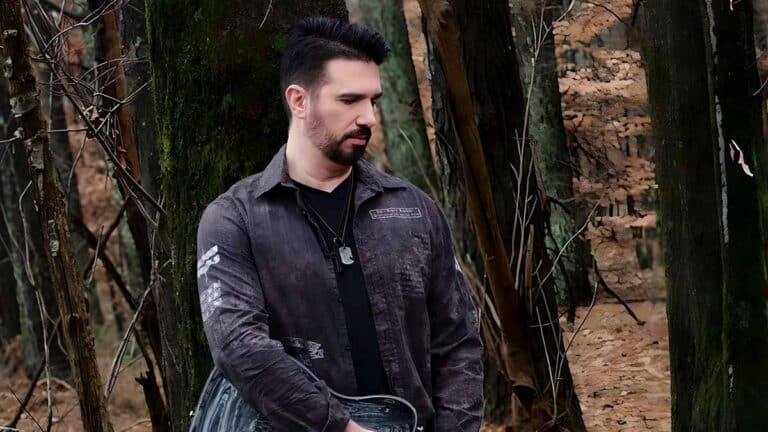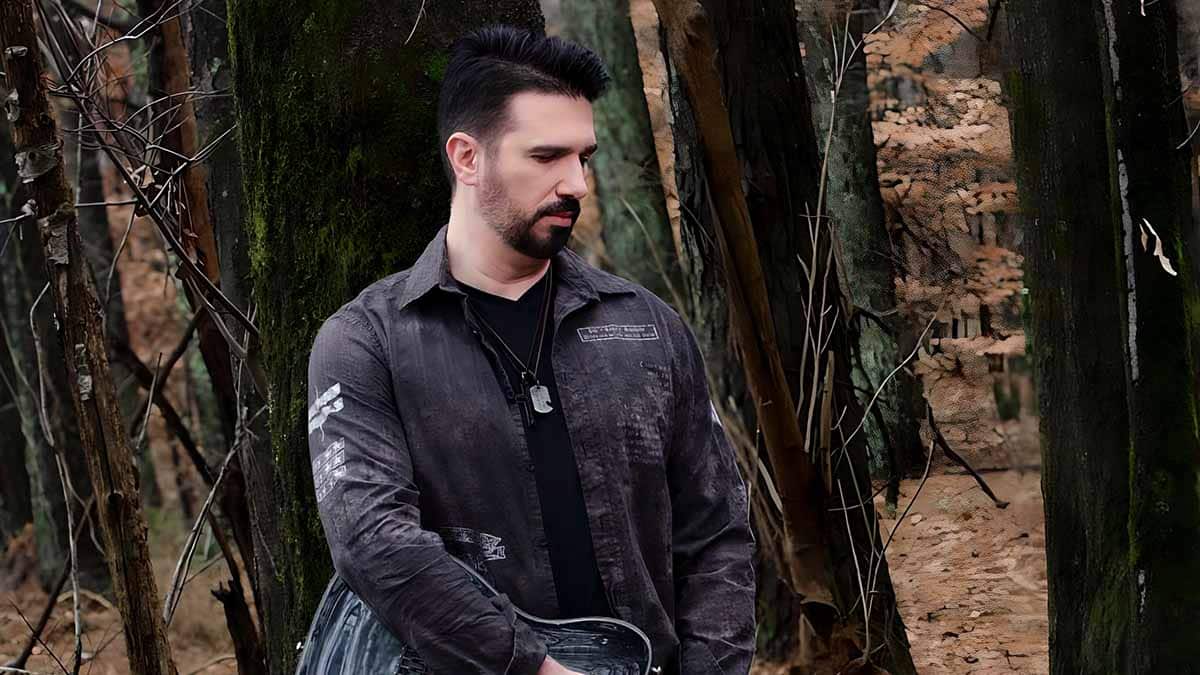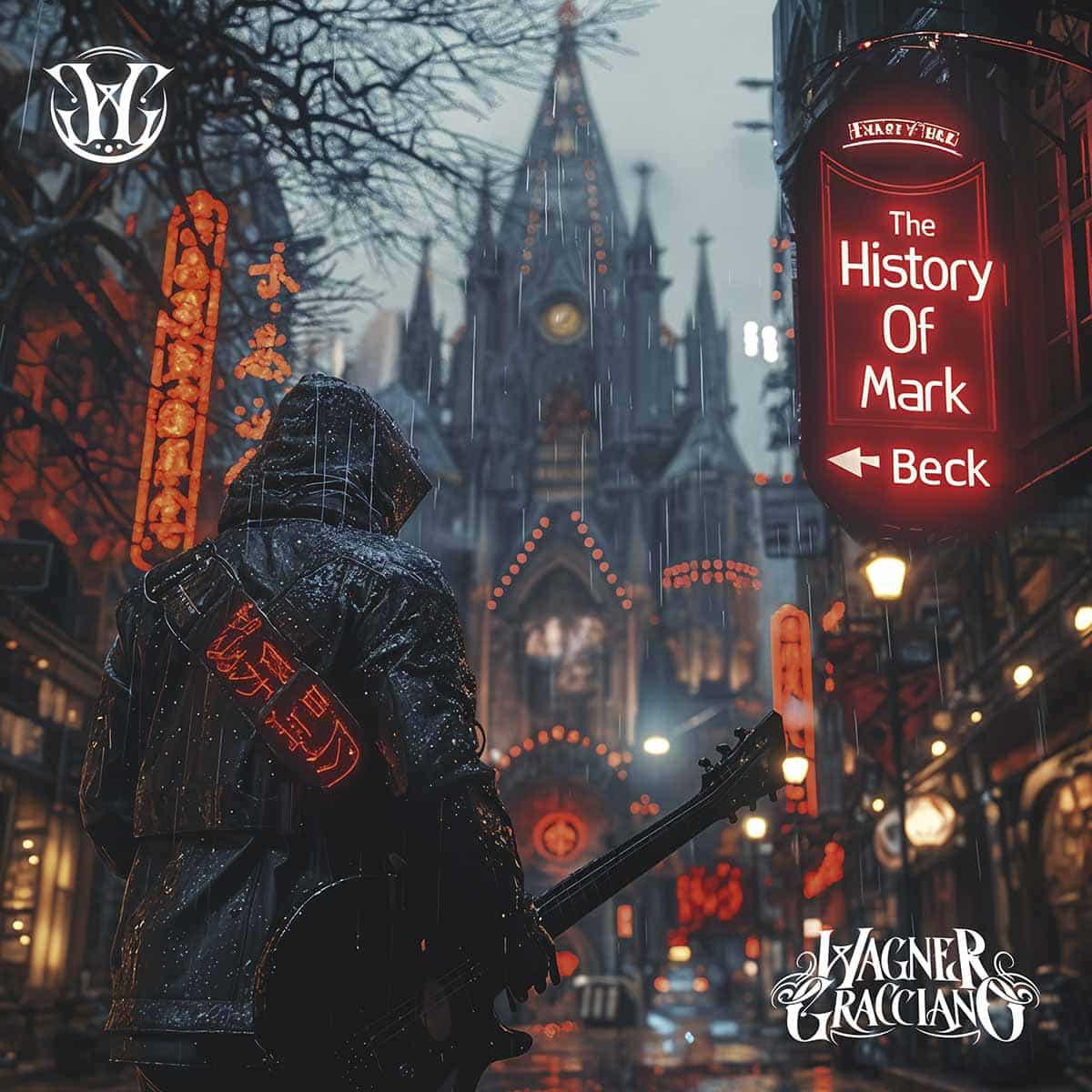You can read this post in:
Português
Wagner Gracciano is an old friend of Groundcast and for this week we have a very nice interview with him about life abroad, how to survive in the music business and how to get his career back on track.
Wagner, you’ve been on Groundcast a few times with our podcast, but now we’re going to try a different format. So let’s start with the basics: Could you tell us a little about your journey in music, what you’ve done, and a brief introduction for those who don’t know you?
Well, I’m Wagner Gracciano, producer, composer, arranger, and guitarist in my spare time. I’m from Goiânia, but now I’m living in Atlanta, USA. Music has always been my life and profession, so I’ve got a few years of experience, haha. I’m privileged to live from my art and to be able to share it with you.
Could you tell us what motivated you to move and set a career in the USA? What were these eight years living in another country like, and what made you continue as a producer and pursue your dream of being a professional musician?
When I wrote and played with the late JJ Jackson, an American bluesman, he suggested I consider moving to another country. That’s when I started thinking about it. After releasing my first album, I realized most of the positive feedback came from abroad. So I started planning a trip to the USA to see if it was really the right place for me. When I got here, I already knew some musician friends in Atlanta, and within two weeks, I fell in love with the way music was treated and started planning to stay.
What were the challenges of being a Brazilian in the US? When I was in the USA, I always felt that people looked at Brazilians respectfully, especially for our hospitality.
The challenges are the same as adapting to any city. The difference is the language and cultural barriers. Many Brazilians complain Americans are very rude and mistreat immigrants. Personally, I had a different experience, because I understand it happens, but thankfully, I never faced any unfortunate incidents. I’ve always been treated with respect, so I even discovered that Americans are as lively as Brazilians.
I believe that if you go anywhere and try to impose your culture or way of life, the result will be so frustrating. Learning to adapt and respect the limits of another culture change everything. It’s like that saying: “We’re not at home; if you behave well and adapt to the house’s rules, you’ll be welcome. If not, forget about it.”
As someone from outside, you must work hard and catch any opportunity to make a name for yourself. This beginning is very challenging. You don’t arrive earning money, space, or the best gigs. Planning for this start was the big secret that helped me a lot.
Can you tell us more about winning the “Prayze Factor Awards”?
This is an award for independent Christian music promoted by TIMA (The International Music Association). It was a huge honor because it’s closely tied to Black RnB and soul culture, and not just anyone can access it. But once you’re in, you realize it’s a very open and loving circle.
Being part of it is incredibly gratifying. It’s an experience that completely changed my view of these musical styles and cultures. It’s not just music; it’s a way of life, very different from what we see in movies, for example.
Which artists have you worked with as a producer? I’ve read that you’ve worked with big names like Ben Reno and Adair Daufembach. What was that experience like?
Besides these two great producers who became friends, in my productions, I never compromise on mixing and mastering with Ben and Adair. They offer different sounds that give me a wide range of options for each project I work on. I’m delighted that they’re on successful paths—Ben becoming one of the biggest names in Nashville, and Adair rising as a major name in the global rock/metal scene.
I also worked with the soul legend Cleveland P. Jones here in Atlanta, who became a great friend and someone I had the pleasure of producing for. Working with Carlos Zema was an enormous pleasure—besides being a friend since our teenage years, he has a unique soul and is now one of the greatest rock/metal vocalists in the world to me. I’ve also worked with many RnB and hip-hop artists here, like AG Baby and Grammy-winning songwriter Cyrrus Deshield, as well as many jazz fusion, prog metal, and even traditional country artists like Red Dirty Cowboys.
Now that you’ve resumed your solo career, could you tell us about “The History of Mark Beck”? I found the album amazing, very well-produced, and diverse, much superior to “Across the Universe.” I sensed a lot of AOR, prog rock, jazz-fusion references, and many other cool influences.
I’m very happy you liked it. The first album is always a learning experience in how to do things, how your style will truly sound, and shows us where we can improve. In this second album, I already had the idea of using my mistakes from “Across” to learn.
It was my first time writing lyrics entirely, which was a huge challenge. It made me respect great lyricists like Bob Dylan and Vinícius de Moraes much more, for example. Writing is as hard as making music, especially when writing in a language that’s not my own. Luckily, I could count on friends who always gave me tips on expressions that would resonate with English-speaking audiences.
Since I’ve been deeply involved in the music scene here in Atlanta, which is considered one of the birthplaces of RnB, soul, and hip-hop, that certainly influenced the album. I also lived in the local prog metal scene. That’s why I didn’t stick to just one style. Music, for me, is about experience—if I can’t directly convey that in the music, it doesn’t work for me.
I could talk about the numerous improvements your sound had on this album. When it was released, I listened on Spotify and was blown away—not only by your evolution as a musician, but by how it breaks away from that concept I dislike about many guitar albums being targeted only at other musicians. How do you analyze your evolution between these two works? Because I feel like this album reflects your journey more than the previous one.
I agree with you. I also don’t like the typical “guitar shredder” album, and in my first one, I was frustrated by not finding singers who could deliver the vision I had at the time. Of course, there are a few standout guitar albums that I think are fantastic, like Satriani’s The Extremist, Vai’s Passion and Warfare, and to me, the holy trinity of instrumental guitar: Steve Morse’s Coast to Coast, Southern Steel, and High Tension Wires. But aside from these, I don’t have much patience. Even those artists later tired of it and started releasing vocal albums.
What I tried to change from my first album (and which is a big problem in many guitar albums) was to have the band truly play, rather than just being a backing track for the guitar to solo over.
I’m really happy with the reception, and I appreciate that you noticed this. I believe that when you focus solely on one instrument throughout an album, it’s hard to create something memorable. It’s like spending all your best ideas right away, and nothing stands out afterward.
When you take the spotlight off the guitar, every solo becomes more appreciated. Like with speed, you don’t need to play an entire solo at lightning speed. One or two fast phrases at the right time create a much greater impact and make much more sense. But musicians, in general, need to work on their egos regarding this—admitting that when each instrument shines, it’s easier to stand out, not the opposite.
We’ve spoken a few times, and I know you’re a very religious person. Why did you decide to tackle the theme of the corruption of religious institutions? Because the more conservative circles within religious institutions don’t usually take kindly to criticism, especially from someone within.
Let me correct you, but in a good-natured way, haha. I don’t consider myself religious—I’m Christian—but it’s completely natural for people to make that comparison.
Let me explain this calmly; it’s a personal thing. Being Christian to me means faithfully following the unnegotiable principles and foundations of Christianity. If a church or institution follows the same path, that’s fine with me, but if not, I’ll stand against it. I follow the word, not dogmas or leaders. Yes, there are some dogmas, but they have to come from something that contributes to faith in a rational way—not things invented or distorted by unscrupulous people. It’s hard to explain clearly, and it’s a very extensive and complicated subject, so I might leave some loose ends here.
Speaking specifically about myself and the album, I accept much better someone who disagrees with me, follows another religion or ideology, but is true to what they believe in and present, than someone who uses what I believe in a frivolous way. In everything in life, I try to be like that. Because, in the end, I can’t convince anyone with arguments alone. Honestly, I don’t believe in arguments—I believe in example. If what someone says is not accompanied by behavior, I don’t waste my time. If you negotiate your principles, your words fall apart.
So, I don’t want to waste my art talking about people who have faith or ideas different from mine, because they don’t have any obligation to me or to please me. But someone who uses my faith in a deceitful way to fool others—then, yes, I’ll get involved.
In short, I have no commitment to institutions or churches that misuse what I believe. Of course, I currently attend an American church that genuinely behaves and delivers a message aligned with what I believe, and I have no problem leaving if that changes. I’m always watching for this and will demand accountability.
The album’s message is exactly about that—a person who had problems, started with a genuinely Christian background but later deviated and had to face the truth. But in the end, if there’s a real change, God’s doors are open. This album is an open critique of false prophets, but it also offers hope for those who repent.
Speaking of albums, what’s it like producing music in the USA? I know that in Brazil, the costs are high for major productions, and the expense of top-notch equipment makes creating and accessing good studios something expensive and out of reach for many people.
It’s expensive here too. Equipment is really cheap, but American labor is extremely costly. I see many people arguing online that a $3000 guitar is outrageous and that no instrument is worth that. But, surprisingly, any handmade sofa set can reach that price. A guitar usually costs as much as a table with four chairs. If it’s handmade, it’s easy to find tables priced between $10,000 and $20,000. That’s because anything manual is truly expensive.
I’ve always produced on my own—I’m a bit of a control freak in that regard. So, I did most of the album at home. Production, arrangements, instrument samples, synthesizers, most of the guitars and bass—I did them all myself in my room. I write everything down to the smallest details for those who are recording. I tend to exaggerate with perfectionism, but I always want people to bring a bit of their own style into it. So, in terms of production, my process hasn’t changed at all.
What changed a lot is that I gained access to professionals here that I found to be much more approachable than I expected.
For instance, Charles Judge, who recorded some pianos on the album, has worked with everyone from Stevie Nicks to Megadeth, Rascal Flatts, Taylor Swift, and the list goes on. Another one was Alex Wright, the keyboardist for Carrie Underwood. These are incredibly kind and generous people.
But it was also wonderful to work with my friends from back home, like Carlos Zema, Roberto Milazzo, Foka, Andre Tavares, and Adair. In that sense, the process was very homemade.
What are your plans for the future? Can we expect a band to start performing shows?
I’m in the process of promoting the album and want to work on organizing some shows. The band is already chosen, but I don’t want to get everyone out there only to struggle.
I want to work hard to record a great DVD with cool audio-visuals. But I’m already itching to make a third album—I’ve even got the idea in mind, haha. That’s what I love to do: sit down and compose.
Now we’ve reached the end, and I want to thank you so much for once again honoring us with this interview. Leave your message for our readers. Go for it!
Thank you so much for the thoughtful questions—I felt truly honored. And a big hug to everyone! I hope you enjoy the work and understand the message. I hope it inspires reflection and comfort.
Follow me on all social media, and The History Of Mark Beck is available on all streaming platforms. Play it loud, from start to finish!
Related Links
https://www.instagram.com/wagnergraccianomusic/
https://www.facebook.com/wagner.gracciano
https://www.youtube.com/WagnerGracciano/videos



